International organisations have expressed deep concern at the spiral of violence in the South Caucasus as civilians get caught in the fighting between Armenians and Azerbaijanis. Wednesday (28 October) was a particularly sad day with both sides reporting civilian casualties.
Azerbaijan accused Armenia of using cluster bombs against densely populated areas in the Barda district, as a result of which 21 civilians were killed and over 70 civilians were wounded. On the same day Armenia accused Azerbaijan of bombing the maternity hospital and other civilian targets in Stepanakert and Shusha. Both sides insist that they are not targeting civilians.
Among those killed and injured in Barda were Red Cross volunteers. The International Committee of the Red Cross in a statement issued at their headquarters in Geneva warned that "the the Nagorno-Karabakh conflict risks spiraling out of control". The statement said:
"Alongside thousands of civilians, the ICRC witnessed intense shelling in urban areas on both sides of the front line today, leading to death, destruction, injuries and desolation. This is unacceptable. Tragically, a volunteer from the Azerbaijan Red Crescent Society, a father of two, was killed in the shelling. Two other volunteers were injured. The ICRC offers its most heartfelt condolences to the family of the volunteer and to the Azerbaijan Red Crescent Society.
"Since the onset of the escalation at the end of September, the ICRC has urged the sides to take all feasible measures to protect and spare civilians and civilian infrastructure like hospitals, schools, markets and cultural property. These are not voluntary gestures. These are obligations under international humanitarian law.
"These latest exchanges signal that the Nagorno-Karabakh conflict risks spiraling out of control. It is civilians across the region who are suffering the consequences. Civilian lives are being lost at an alarming rate and people are also suffering life-changing injuries. Significant damage has also been inflicted on civilian infrastructure, including medical facilities.
"The ICRC is in contact with the sides in bilateral, confidential dialogue to remind them of their obligations under international humanitarian law. The appalling scenes that we are seeing cannot continue."
A statement was also issued in Brussels by the European Union.A statement by Spokesperson, Peter Stano, issued on Wednesday evening (28 October) and posted on the website of the European External Action Service said:
‘‘The European Union finds it unacceptable that after three agreements brokered by Russia, France and the United States on a ceasefire, the fighting in and around Nagorno Karabakh still continues and there are more and more reports of civilians being targeted.
The European Union reminds the sides to the conflict of their obligations to protect civilian lives under international humanitarian law. The European Union urges the sides to engage in substantive negotiations on a peaceful settlement of the Nagorno Karabakh conflict without delay, as last agreed in Washington on 25 October.''
source: commonspace.eu
photo: An old man searches in the rubble of a house detroyed by a bomb in Barda






